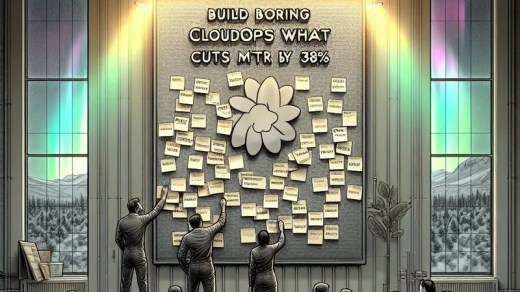Burnout Beyond Repair: When Passion Turns to Exhaustion
In the high-stakes of DevOps, where the relentless pursuit of uptime and innovation is the norm, burnout is an ever-present specter. Initially fueled by passion and dedication, DevOps engineers can find themselves caught in a downward spiral of exhaustion, cynicism, and disillusionment. Recognizing the signs of burnout and understanding when it’s time to move on is crucial for preserving your well-being and career trajectory.
The Slow Burn: Recognizing the Subtle Signs
Burnout rarely manifests overnight. It’s a gradual erosion of your enthusiasm, energy, and sense of purpose. The early signs can be subtle: a persistent feeling of fatigue, difficulty concentrating, increased irritability, and a waning interest in your work. You might find yourself dreading the start of each day, struggling to find motivation, or feeling overwhelmed by even minor tasks. These seemingly innocuous symptoms can easily be dismissed as normal stress, but they are often the first whispers of impending burnout.
The Tipping Point: When Exhaustion Takes Over
As burnout progresses, the symptoms become more pronounced and debilitating. Your productivity plummets, your creativity dries up, and your ability to problem-solve diminishes. You might experience physical symptoms such as headaches, insomnia, or digestive problems. Emotionally, you may feel cynical, detached, or even resentful towards your work and colleagues. The passion that once fueled your drive is replaced by a sense of emptiness and disillusionment. At this stage, burnout is no longer a whisper; it’s a deafening roar that demands your attention.
The Cost of Neglect: The Ripple Effects of Burnout
Ignoring the signs of burnout can have devastating consequences for your personal and professional life. Chronic stress can weaken your immune system, making you more susceptible to illness. It can also exacerbate existing health conditions, such as high blood pressure or heart disease. Mentally, burnout can lead to depression, anxiety, and even suicidal thoughts. Professionally, burnout can derail your career, leading to poor performance, missed deadlines, and strained relationships with colleagues and clients. The longer you ignore the signs, the more difficult it becomes to recover.
The Decision Point: Knowing When to Walk Away
If you find yourself in the throes of burnout, it’s time to take a hard look at your situation and decide if it’s time to move on. If your current job is the primary source of your burnout, a change of scenery might be necessary. This could mean seeking a new position within your current company, transitioning to a different role or industry, or taking a break from work altogether to recharge and reassess your priorities. If your burnout is rooted in deeper issues, such as a toxic work culture, lack of support, or unrealistic expectations, simply changing jobs might not be enough. In these cases, seeking professional help from a therapist or counselor can be invaluable in addressing the underlying causes of your burnout and developing strategies for coping with stress.
Burnout is a serious issue that can have a devastating impact on your well-being and career. Recognizing the signs early on and taking proactive steps to address them is crucial for preventing burnout from reaching a point of no return. If you’re struggling with burnout, don’t hesitate to seek help from a trusted friend, family member, or professional. Remember, your health and happiness are paramount. Don’t sacrifice them on the altar of a job that leaves you feeling exhausted, disillusioned, and unfulfilled.
Stagnant Skills and Stunted Growth: The Plateau of No Return
In this dynamic specialty, where technology evolves at breakneck speed, continuous learning and growth are not just desirable; they’re essential for survival. However, there comes a point in some DevOps engineers’ careers where they hit a plateau, a point of stagnation where their skills stagnate, their growth stalls, and their career trajectory flatlines. Recognizing this plateau and understanding when it’s time to move on is crucial for reigniting your passion, rekindling your curiosity, and unlocking your full potential.
The Comfort Zone: A Double-Edged Sword
In the early stages of a DevOps career, the learning curve is steep, the challenges are exciting, and the opportunities for growth seem endless. However, as you gain experience and master your craft, it’s easy to settle into a comfortable routine. The familiar becomes reassuring, and the unknown becomes daunting. You may find yourself gravitating towards tasks and projects that lie within your comfort zone, avoiding challenges that push you outside your boundaries. While this comfort zone can provide a sense of security and stability, it can also become a trap, stifling your growth and limiting your potential.
The Warning Signs: Recognizing the Plateau
The signs of stagnation can be subtle at first, but they become increasingly apparent over time. You might find yourself feeling bored or unchallenged by your work, lacking the enthusiasm and curiosity that once fueled your drive. Your skills may become outdated as new technologies and methodologies emerge, leaving you feeling behind the curve. You may also notice a decline in your performance, as you struggle to keep up with the demands of a rapidly evolving industry. If you’re not actively learning and growing, you’re effectively falling behind.
The Cost of Complacency: The Perils of Stagnation
Stagnation is not merely a state of inactivity; it’s a slow and insidious decline. When you stop learning and growing, your skills become obsolete, your value diminishes, and your career prospects dwindle. You become less competitive in the job market, less attractive to potential employers, and less likely to be considered for promotions or new opportunities. Moreover, stagnation can take a toll on your mental and emotional well-being. The lack of challenge and growth can lead to boredom, frustration, and even depression. It can also erode your confidence and self-esteem, as you begin to doubt your abilities and question your value.
The Escape Route: Breaking Free from the Plateau
If you find yourself on the plateau of no return, it’s time to take decisive action. The first step is to acknowledge the problem and commit to change. This might involve setting new learning goals, seeking out challenging projects, or pursuing additional training or certifications. It might also mean seeking out a new job that offers more opportunities for growth and development. The key is to break free from your comfort zone and embrace the unknown. This can be a daunting prospect, but it’s also an exhilarating one. By pushing yourself outside your boundaries, you’ll discover new skills, new passions, and new possibilities.
In the ever-evolving world of DevOps, stagnation is not an option. If you want to stay relevant, competitive, and fulfilled in your career, you must commit to continuous learning and growth. Don’t let the comfort of the familiar hold you back. Embrace the challenge of the unknown, seek out opportunities to expand your skillset, and never stop pushing yourself to reach your full potential. Remember, the plateau of no return is not a destination; it’s a detour. By taking the right steps, you can get back on track and continue your journey towards a fulfilling and successful career in DevOps.
Toxic Culture: A Breeding Ground for Misery and Mishaps
In the intricate machinery of a DevOps team, a toxic culture acts as a corrosive agent, eroding productivity, innovation, and the very well-being of its members. It’s a breeding ground for misery and mishaps, where negativity festers, conflicts escalate, and the potential for catastrophic errors looms large. Recognizing the signs of a toxic culture and understanding its insidious impact is crucial for DevOps engineers contemplating their next career move.
The Silent Poison: Recognizing a Toxic Culture
A toxic culture is not always overt. It often manifests in subtle ways, gradually seeping into the fabric of the team and infecting every interaction. One of the most common signs is a pervasive sense of negativity and cynicism. Team members may constantly complain, criticize, or gossip about each other, creating a climate of distrust and resentment. Another red flag is a lack of psychological safety, where individuals feel afraid to speak up, share ideas, or challenge the status quo. This fear of retribution stifles creativity, innovation, and the ability to learn from mistakes.
The Culture of Blame: A Recipe for Disaster
In a toxic DevOps environment, blame is the default response to failure. Instead of analyzing the root causes of problems and working collaboratively to find solutions, team members are quick to point fingers and assign blame. This creates a culture of fear and defensiveness, where individuals are more concerned with protecting themselves than with finding the best solutions for the team. The result is a vicious cycle of recurring errors, escalating tensions, and declining morale.
The Communication Breakdown: A Silent Killer
Effective communication is the cornerstone of any successful team, but in a toxic culture, it’s often the first casualty. Instead of open and honest dialogue, communication becomes passive-aggressive, manipulative, or simply nonexistent. This breakdown in communication creates silos within the team, undermines collaboration, and makes it difficult to identify and address problems before they escalate into major crises. When team members feel unheard, undervalued, or disrespected, their motivation plummets, and their commitment to the team’s goals wanes.
The Domino Effect: Impact on Performance and Well-being
A toxic culture doesn’t just affect the emotional climate of a team; it has a direct impact on performance and well-being. The constant stress and negativity can lead to burnout, anxiety, depression, and other mental health issues. Physical health can also suffer, as chronic stress weakens the immune system and increases the risk of cardiovascular disease, insomnia, and other ailments. On a professional level, a toxic culture can lead to decreased productivity, increased absenteeism, and a higher rate of turnover. The constant turnover further destabilizes the team, making it difficult to build trust, establish effective processes, and achieve long-term goals.
The Escape Hatch: Knowing When to Leave
If you find yourself in a toxic DevOps environment, it’s important to recognize that you’re not obligated to stay. Your mental and emotional well-being are paramount, and no job is worth sacrificing your health or happiness. If you’ve tried to address the toxic culture through internal channels and seen no improvement, it may be time to consider moving on. Before you make your exit, document your experiences, including specific instances of toxicity, discrimination, or unethical behavior. This documentation can be invaluable if you need to file a formal complaint or seek legal recourse later on. Network with contacts in your field, update your resume and LinkedIn profile, and start exploring other opportunities. Remember, a toxic workplace is not a reflection of your abilities or worth. There are plenty of healthy, supportive, and fulfilling environments where you can thrive.
A toxic culture is a cancer that can eat away at the heart of a DevOps team, leaving behind a trail of misery and mishaps. By recognizing the signs of toxicity, understanding its insidious impact, and knowing when to walk away, you can protect yourself from its corrosive effects and find a workplace where you can truly thrive. Remember, your career is a journey, not a destination. Don’t settle for a toxic environment that compromises your well-being, your values, or your potential. There are better options out there, and it’s up to you to find them.
Greener Pastures Await: Recognizing When Opportunity Knocks
Staying stagnant can be a career killer, period. While loyalty and commitment to a company are admirable, there comes a time when recognizing the signs of greener pastures is crucial for professional growth and personal fulfillment. For DevOps engineers, these signs can manifest in various ways, from exciting new technologies to a company culture that truly values your contributions.
The Technological Allure: Embracing the Cutting Edge
DevOps is a field that thrives on innovation. New tools, platforms, and methodologies emerge constantly, pushing the boundaries of what’s possible. If your current role has you stuck in a technological rut, using outdated tools or working on legacy systems, it might be time to look for greener pastures. A company that invests in cutting-edge technologies not only offers you the chance to expand your skillset and stay ahead of the curve but also demonstrates a commitment to innovation and growth. This can be incredibly motivating for a DevOps engineer who thrives on challenges and continuous learning.
The Cultural Shift: Finding a Place Where You Belong
Company culture plays a pivotal role in job satisfaction and overall well-being. If your current workplace is plagued by toxicity, micromanagement, or a lack of recognition for your contributions, it can be a major drain on your motivation and enthusiasm. Greener pastures may beckon in the form of a company that fosters a positive, supportive, and inclusive culture. A workplace where your voice is heard, your ideas are valued, and your work-life balance is respected can be a game-changer for your career and personal life.
The Compensation Conundrum: Knowing Your Worth
While salary shouldn’t be the sole factor in your career decisions, it’s certainly an important consideration. If you feel undervalued and underpaid compared to your peers in the industry, it might be a sign that you’re not being adequately compensated for your skills and expertise. Greener pastures could offer a significant salary increase, bonuses, stock options, or other financial incentives that reflect your true value. A company that invests in its employees financially demonstrates a commitment to their growth and success.
The Career Trajectory: Plotting Your Path to Success
A clear career path is essential for long-term professional growth. If your current role offers limited opportunities for advancement or if your career goals are misaligned with the company’s vision, it might be time to explore other options. Greener pastures may present themselves in the form of a company with a well-defined career ladder, mentorship programs, or opportunities to take on leadership roles. A company that invests in your professional development and supports your career aspirations can be a catalyst for achieving your full potential.
The Gut Feeling: Trusting Your Instincts
Sometimes, the most compelling sign that greener pastures await is simply a gut feeling. If you’re feeling unfulfilled, unchallenged, or undervalued in your current role, it’s important to listen to your intuition. Don’t ignore that nagging feeling that there’s something better out there for you. Trust your instincts and start exploring your options. Talk to colleagues, network with professionals in your field, and research companies that align with your values and career goals. You might be surprised at the opportunities that await you.
The decision to leave a job is never easy, but recognizing when greener pastures await is a crucial step towards achieving your full potential as a DevOps engineer. Whether it’s the allure of cutting-edge technologies, a positive company culture, a significant salary increase, a clear career path, or simply a gut feeling, these signs can guide you towards a more fulfilling and rewarding career. Remember, staying stagnant is not an option in the fast-paced world of DevOps. By embracing change and pursuing new opportunities, you can unlock your full potential and achieve your career aspirations.



















